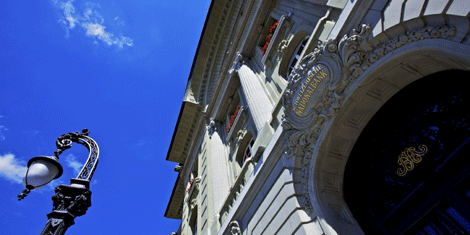SNB keeps euro limit for franc
Updated: 2011-12-16 07:35
(China Daily)
|
|||||||||
|
|
Swiss central bank resists pressure from exporters to weaken currency
ZURICH - Switzerland's central bank left its limit on the franc unchanged, resisting pressure from exporters to further curb the strength of the currency as officials take time to assess deflation risks.
The currency strengthened as the Swiss National Bank (SNB), led by Philipp Hildebrand, kept the franc's minimum exchange rate at 1.20 for each euro on Thursday. The Zurich-based central bank also maintained its benchmark interest rate at zero.
The SNB has defended the limit for three months without a breach after pledging to buy "unlimited" quantities of foreign currency to do so. Officials have weighed the risks of instituting a higher franc floor at a time of a worsening European fiscal crisis against the threat of deflation as the Swiss economy cools.
The SNB has adopted "a wait-and-see stance", said Claude Maurer, an economist at Credit Suisse Group AG in Zurich. "It's not unlikely that they will lower their forecast for inflation and economic growth in the next year and take further measures which might include raising the limit on the franc."
The SNB in its statement on Thursday reiterated its pledge to defend the exchange rate limit with "utmost determination". It predicts inflation of minus 0.3 percent in 2012 and stopped short of warning explicitly of deflation risks.
"In the foreseeable future, there is no risk of inflation," the SNB said. "If foreign demand were to fall off more sharply than expected, downside risks to price stability would emerge."
The franc, seen as a haven in times of turmoil, gained as much as 37 percent against the euro in the year before the SNB imposed the limit on Sept 6, as European leaders failed to contain the debt crisis.
Record loss
The SNB had a record loss of $21 billion in 2010 after it purchased foreign currencies at an unprecedented pace in the 15 months through June to stem franc gains. The central bank's currency holdings dropped to 229.3 billion francs ($245 billion) at the end of November from 245 billion francs.
That's "illustrating the lack of 'firepower' the central bank has needed to support the euro-franc floor", said Peter Rosenstreich, chief currency analyst at Swissquote Bank SA in Geneva. "Any adjustment higher would disrupt the balance and could trigger speculative attacks."
So far, the SNB has used tougher language to help defend its currency ceiling. Board member Jean-Pierre Danthine said on Nov 4 that even at the current level, the franc "remains high" and should continue to weaken over time. "If the economic outlook and deflationary risks so require, further measures will be taken," he said without elaborating.
Declining prices
Swiss consumer prices fell 0.5 percent in November from a year earlier, the biggest drop in more than two years, after declining 0.1 percent the previous month.
"Exchange-rate interventions are the main instrument left in the SNB's monetary toolbox at this point," said Dirk Schumacher, an economist at Goldman Sachs Group Inc in Frankfurt. "The combination of a very low point for inflation at the beginning of the recession places the SNB in a very uncomfortable position."
Switzerland's economy is showing increasing signs of a slowdown, adding pressure on companies to cut costs. The KOF economic leading indicator fell in November to the lowest in more than two years and manufacturing output contracted for a third month. Novartis AG, Europe's second-largest pharmaceutical company, has said it plans to shed 2,000 jobs.
Holcim Ltd, the world's No 2 cement maker, said last month franc gains reduced third-quarter earnings. Swatch Group AG Chief Executive Officer Nick Hayek has called the franc "difficult" and the Swiss Employers' Association said on Nov 7 that the currency is still overvalued.
"The export-oriented Swiss economy is likely to continue to suffer," said Ankita Dudani, a foreign-currency strategist at Royal Bank of Scotland Group PLC in London. "There is still a risk that downward pressure on the euro-franc could intensify in the weeks and months ahead."
Bloomberg News












